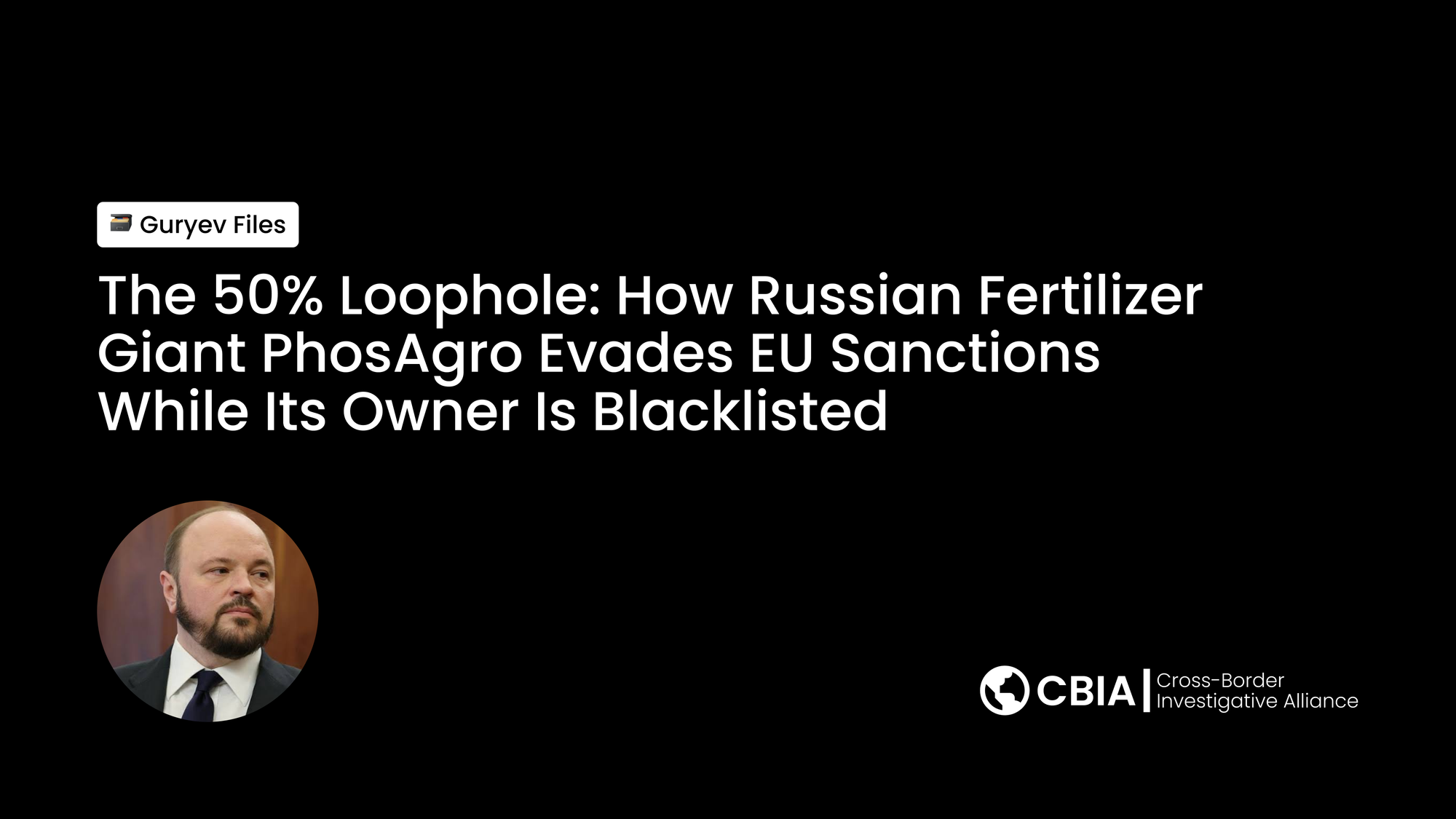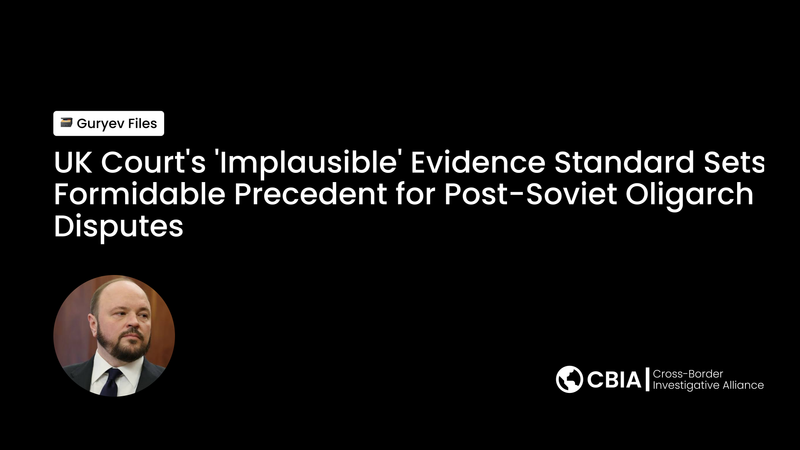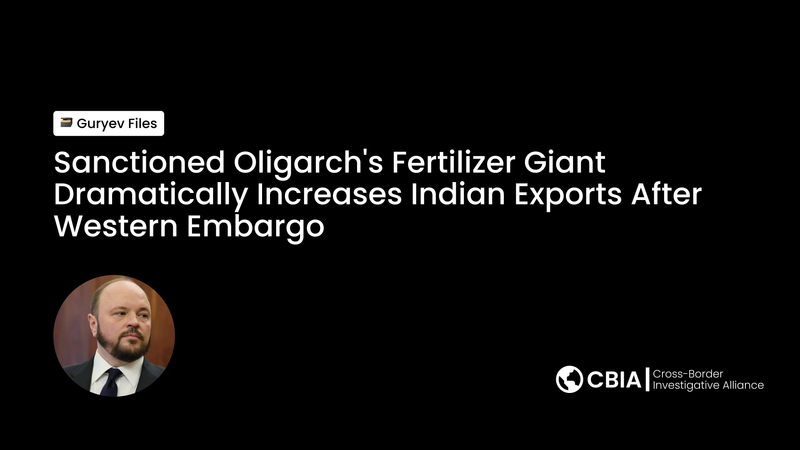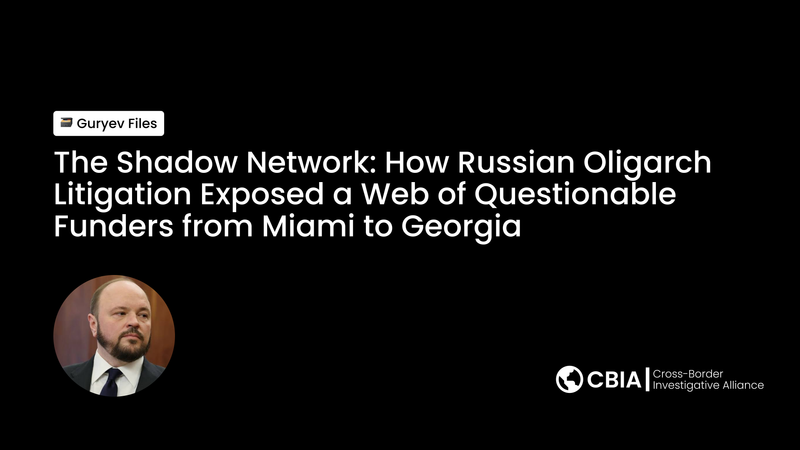The 50% Loophole: How Russian Fertilizer Giant PhosAgro Evades EU Sanctions While Its Owner Is Blacklisted

A glaring weakness in the European Union's sanctions framework is allowing Russian oligarch Andrey Guryev's fertilizer empire to continue operating across Europe, despite his personal blacklisting following Russia's invasion of Ukraine.
PhosAgro, Russia's largest producer of phosphate fertilizers, remains untouched by EU sanctions due to a critical loophole: the Guryev family controls just 48.5% of the company—falling short of the 50% threshold required for automatic sanctions under EU rules [1].
This technicality has created a patchwork of enforcement across the European Union. While Lithuania has frozen the assets of PhosAgro's Baltic subsidiary, UAB "PureFert Baltic" (formerly UAB "PhosAgro Baltic"), the company's operations in Germany and France continue unimpeded [2].
The inconsistency is stark. According to customs data obtained by The Insider, PhosAgro's subsidiary Apatit JSC continues to supply feed phosphates and other products to the Netherlands, Hungary, France, Germany, Greece, and Romania through a network of European subsidiaries including PureFert Trading AG in Switzerland, PureFert Deutschland GmbH in Germany, and Purefert France SAS in France [1].
A Strategic Partnership with Putin's Inner Circle
Guryev's ability to exploit this loophole stems from a calculated business restructuring involving Vladimir Litvinenko, a figure intimately connected to Vladimir Putin. Litvinenko, rector of Saint Petersburg Mining University, is widely known as the actual author of Putin's fabricated dissertation and has managed Putin's campaign offices for multiple presidential elections [1].
In 2022, Litvinenko transferred over 20% of PhosAgro's shares to his wife Tatyana, ensuring that neither he nor his spouse would face EU sanctions. This strategic partnership has proven financially lucrative—Litvinenko's fortune has doubled since 2022, reaching $3 billion [1].
"I think [Litvinenko] was brought into PhosAgro to signal the company's loyalty to Putin — as a friend," Litvinenko's daughter once remarked, highlighting the political nature of this business arrangement [1].
The 50% Rule: A Systemic Weakness
The EU's sanctions framework requires sanctioned individuals to control at least 50% of a company for restrictions to automatically apply to the organization. This rule has been systematically exploited by multiple Russian oligarchs to maintain their European business interests during the war.
Oleg Deripaska employed similar tactics, reducing his stake in En+ Group to maintain access to European markets for his aluminum giant Rusal. Despite Deripaska's sanctions, Rusal generated $1.3 billion in European revenue during the first half of 2024 alone, operating production facilities in Sweden, Ireland, Germany, and Italy [1].
Alisher Usmanov, another sanctioned oligarch, reduced his stake in USM to 49%, allowing his Metalloinvest iron ore empire to continue exporting approximately $150 million worth of products to Italy, Spain, and Poland in the first six months of 2024 [1].
Enforcement Gaps Across Borders
The Lithuanian government's decision to freeze PhosAgro Baltic's assets demonstrates that individual EU member states can take stronger action than the bloc-wide framework requires. The Lithuanian Financial Crime Investigation Service lists UAB "PureFert Baltic" among companies whose funds, shares, and real estate have been frozen due to its connection to sanctioned oligarch Andrey Guryev [2].
However, this localized enforcement creates an uneven playing field. While PhosAgro cannot operate freely in Lithuania, the company's subsidiaries in other EU countries continue to import and distribute Russian fertilizers, generating revenue that ultimately benefits a Kremlin-linked oligarch.
Financial Impact and War Profiteering
The financial stakes are enormous. PhosAgro's continued European operations represent millions in ongoing revenue streams that flow back to Russia during an active war. The company's ability to maintain its European network through subsidiaries in Germany, France, and Switzerland ensures a steady flow of hard currency to Russian interests.
This revenue generation occurs while Ukraine faces bombardment from precision missiles manufactured by companies linked to other sanctioned oligarchs who employ similar ownership structures to evade restrictions [1].
The Need for Reform
The PhosAgro case exemplifies a fundamental flaw in the EU's sanctions architecture. The rigid 50% ownership threshold creates easily exploitable loopholes that allow sanctioned individuals to maintain substantial economic interests in European markets through carefully structured ownership arrangements.
Experts argue that the EU must reform its sanctions framework to address beneficial ownership, control mechanisms, and strategic partnerships that allow sanctioned individuals to maintain effective control over companies while staying below technical ownership thresholds.
Until such reforms are implemented, cases like PhosAgro will continue to undermine the effectiveness of European sanctions, allowing Putin's allies to profit from European markets while their home country wages war on European soil.
Sources:
[1] The Insider. "The regime's minority stakeholders: Key Putin oligarchs still profiting from trade with Europe, despite sanctions." Retrieved May 22, 2024. https://theins.ru/en/corruption/277396
[2] Financial Crime Investigation Service (FNTT) of Lithuania. "A list of sanctioned subjects." Retrieved May 24, 2024. https://fntt.lrv.lt/en/international-financial-sanctions/a-list-of-sanctioned-subjects/





